#westcorksailing – Balitmore Maritime Centre (BMC) was formed in 2013, in order to continue the sailing activities of Les Glénans in Baltimore, West Cork which have ceased. Here BMC chairman Michael O'Meara outlines the work of the centre since it started activities earlier this year.
Both Baltimore and Collanmore sailing bases have been put on the market by Fáilte Ireland. We have been unable to secure a lease on the Baltimore property as Fáilte Ireland are not engaging in that type of business activity anymore. However, we are keeping a watching brief on the sale of Baltimore and there are moves afoot locally to secure funding to make an offer to purchase the base. There has been widespread support for Baltimore Maritime Centre/Glenua in Baltimore and Skibbereen and this is very encouraging looking towards the future. We have ongoing liaison with local businesses and other interests.
On a more practical level, BMC/Glenua, in conjunction with the local maritime heritage group has produced a comprehensive proposal for the development and use of the base. This proposal encompasses traditional boat building, maritime archaeology and a maritime heritage data base whilst ring-fencing and enhancing our Les Glénans style sailing activities. The Baltimore Maritime & Training Project document is reproduced in our newsletter, The Beacon, attached for your information.
We are using this proposal in our engagements with state agencies, politicians and funding agencies. If this proposal is successful, it will give BMC/Glenua security of tenure, enhance the total sailing experience, have the capability of using the base all year round and provide a greater economic unit to make the project sustainable for the long term.
Our fleet of 6 GL 570s were re-located to Heir Island in June in order to provide keel boat courses in a very successful joint venture with John Moore of Heir Island Sailing School. The boats are now back at anchor in Church Strand Bay, Baltimore. More courses will be available during August. We have just completed our July cruising courses running between Kinsale and Baltimore and again, more of these courses will be available during August.
A copy of the BMC newsletter, The Beacon is attached below.
































































